Community Insights
Communities are like reservoirs
[This is the first of a regular series of articles about the College Confidential community. I’m writing them for an internal audience and this is a slightly edited version for an external audience.]
I’ve compared communities to hydroelectric dams in the sense that they’re difficult to get started yet provide ongoing value if well maintained. To extend the metaphor a little bit, the reservoir behind a dam works like any group of people. People flow into groups via inlets and leave via outlets. The size of a group continually changes as people come and go. This is true of all types of groups, not just online communities.
My wife is a leader in Cub Scouts. People find out about the pack via Facebook, personal recommendation, membership drives and flyers at school. Every year many families join and many families leave. Usually they leave because their children age out of the program. But they also leave because they are moving out of state or just lose interest. It’s not much different from College Confidential in that respect.
Inlets
Google Analytics provides a useful summary of how people come to CC:1
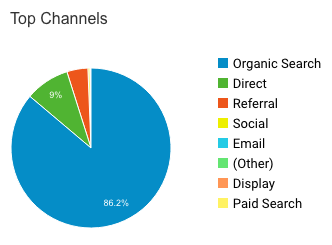
A quick summary of what those channels represent:
- Organic search is people entering a search term into Google (or Bing, I suppose)
- Direct means the person typed the URL directly or used a bookmark.2
- Referrals come from sites that link to CC, which aren’t social media sites.
- Social covers Facebook, Instagram, Twitter, etc.
- Email means the traffic comes from an email we sent out with a UTM tag.3
Because of the way Google Analytics is set up, links from https://www.collegeconfidential.com/ are counted as Referral. ~80% of referral traffic comes from the WWW side of CC. We can infer that many (and perhaps, most) of those people are already CC forum users who are simply navigating around the site. Most Direct traffic is also likely to be people who are already part of the community.
With 87% of traffic coming from organic search, Google is our primary source of visitors. This is typical for mature communities and CC has been around for 2 decades. Early on it was the only place to get information about college admissions. Now we are competing with reddit, social media and the schools’ websites for search traffic. To bring it back to the reservoir analogy, new dams have been built upstream from us to divert flows away from CC.
Our dependence on Google for traffic is not unique, but we do have advantages because we offer interactive discussion. If you can’t find what you're looking for, you can start a discussion. Google is beginning to recognize the value of forums and members of the community continue to add to our content library for minimal cost. New content relevant to our audience is the best way to attract more search traffic, so it’s a virtuous cycle.
I anticipate search will be the topic of a future community insight article. But to summarize: Nearly all of CC’s new users come from Google.
Outlets
“All happy families are alike; each unhappy family is unhappy in its own way.”
—Leo Tolstoy, Anna Karenina
There are many ways for people to drop out of CC. Perhaps the healthiest is when students complete their education or parents run out of college-age children. College Confidential served its purpose and people move on.4 We can think of this as the water that runs through the turbines and generates the power of the community. If we’ve genuinely helped students and their families, the community has provided value. This is the best way to sell CC to the next generation.
On the opposite end of the spectrum, we have people who visit CC a few times and never return. Think of this as evaporation—that outlet provides little value. An easy-to-categorize type of pageviews come from bots/crawlers. Those will never convert to active users, but we do get value from them because they index the site so that search engines can show our pages to people looking for information. (Remember, this is our top source of new users.)
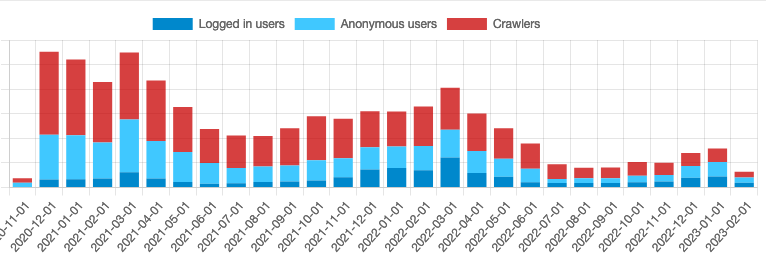
Metrics like bounce rate give us an idea of how many people leave on their first visit. All other things being equal, we want lower bounce rates. What we really want to know, however, is how many people come back to the site over and over again. Unfortunately, we can’t easily track individual visitors before they register.5
Before going on, I do need to point out two oddities with our data:
- We changed platforms for the forums in November, 2020. As a result we do not have easy access to data about anonymous users before that month.
- From June, 2021 to June, 2022 CC required registration in order to browse the site.6
The result is a natural experiment on the behavior of lurkers. Before we required registration to browse, 18% of non-bot traffic came from registered users. After we required registration, the rate increased to a max of 60% as regular readers had a reason to register. It fluctuated a fair amount, however. The average for that period was 38%. Almost all of the anonymous traffic in this period was from people who visited only a few pages or who used ad-blocking technology.
After we removed the registration wall, the rate of registered pageviews stabilized at around 46%. Since nearly all of our regular lurkers had converted to registered users or left the site, we can estimate what proportion of pageviews come from people who read the site regularly, but don’t contribute. Normally these people wouldn’t bother to register. So if we assume ~18% of pageviews still come from contributors, we can estimate that ~28% of pageviews come from regular readers who don’t post.
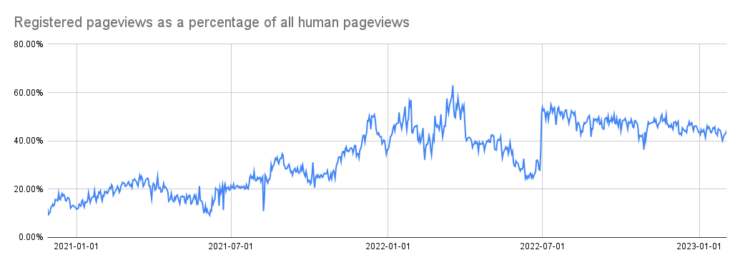
From the perspective of community management, traffic from lurkers is like the water that’s released downstream via a spillway. It’s not driving the engine of the community (posts) so it doesn’t help our growth. That said, this traffic can be very valuable for other parts of the business such as advertising and lead generation. It’s just that the greater benefit comes from people who contribute to the site in some way.
Outside of the period where we required registration to read the site, people generally register only when they intend to contribute in some way. So another outlet happens when people register, but don’t contribute. Because of the seasonality of the college application process, the rate of people who contribute at least one post in the 30 days after they register varies. In the summer months, we see about 35% of registered users contribute. In March, during peak decision season, the rate is closer to 60%.
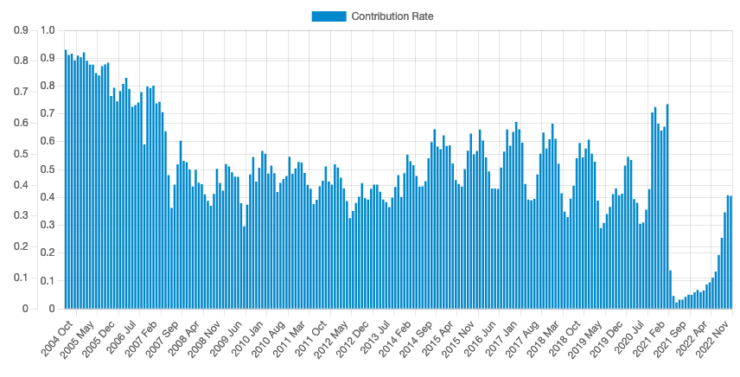
The rather dramatic dropoff from June 2021 to June 2022 coincides with the registration wall. Many people who had no intention of contributing registered so that they could read the site. One might hope that they would decide to contribute now that they had an account to do so, but very few actually did. The jump from lurking to contributing has always been large.
Finally we have people who register, maybe contribute for a while and then leave for whatever reason. Again this is highly seasonal. People who register in March tend to be students who want to interact with other students who applied to the same schools they did. After regular decision season, those students don’t see any reason to stick around. Meanwhile, students who register in the fall, tend to stick around at least through the end of decision season.
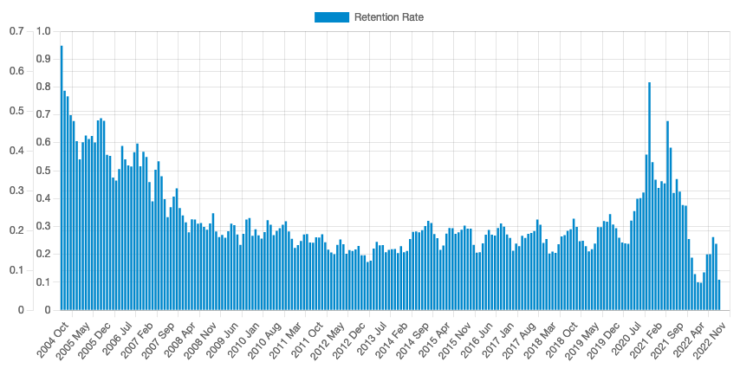
I should point out that both the contribution rate and retention rate increased rather dramatically from November 2020 to June 2021. This was the time from when we moved from Vanilla Forums to Discourse. The more modern platform offers many features that encourage participation. In addition, the old forums looked very much as if they had been transported in from the early 2000s. (No surprise since that’s exactly what had happened.) By providing a more familiar looking platform, we increased the odds people would contribute and stick around.
Summary
College Confidential gets almost all of its incoming traffic via Google search.
People leave the site when they:
- immediately bounce off of the page they land on.
- read the content on the site, but never decide to register.
- register, but never contribute.
- contribute for a short period of time, but stop returning.
- complete their college admission journey and move onto other pursuits in life.
In the long run, increasing contribution and retention rates will increase the quantity and quality of content on CC. That, in turn, is the best way to bring in new visitors via search traffic.
This is just the forums. The WWW section is 58% Organic Search and 32% Direct.↩︎
These days it is likely they started to type the URL and it turned up as an autocomplete option.↩︎
If I send an email with a CC link, it won’t have a UTM and will be counted as Direct instead.↩︎
Our most dedicated users are parents whose children have grown up. It’s important to understand that these folks care deeply about the next generation and also have formed friendships on CC. This isn’t a goal for us, but it’s a sign of a strong and vibrant community.↩︎
This isn’t even about privacy policies. If I visit a site from my work computer, again on my phone during lunch and a third time from my personal laptop at home, I will look like three different people.↩︎
I wrote about this on my blog.↩︎